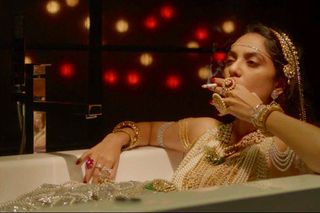
‘Made In Heaven’ Shows the Calculated Compromises Women Make to Survive
Its characters operate within the constraints of the traditional big, fat Indian wedding — and of society.

Zoya Akhtar and Reema Kagti’s latest creation, after the undeniable success of Gully Boy, comes in the form of an Amazon Prime web series about two wedding planners who must navigate the deceptively glossy world of Indian weddings. Set in affluent South Delhi, where pedigree and money are somewhat interchangeable, Made in Heaven functions as mirror, showing us the lengths people will go to, and the sacrifices they will make, in order to protect themselves.
More specifically, the women in the 9-part series make compromises throughout — about their happiness, their marriages and their futures. As viewers come to see, no matter what they do, they’re never truly free.
Each episode centers a different family’s wedding celebrations, as the two protagonists and founders of the eponymous start-up, Tara (Sobhita Dhulipala) and Karan (Arjun Mathur), pull together the extravagant requirements of the big, fat Indian wedding. But Tara, Karan, and the other employees at the company each have their own struggles to deal with, making their creation of people’s happiest day a delicate balancing act. The narratives, written by Akhtar, Kagti and Alankrita Shrivastava (of Lipstick Under My Burkha), touch on a variety of subjects, from political maneuvering, to sexual assault; infidelity to homosexuality; dowry demands to honor killings. But the show does a surprisingly good job of allowing each issue depth, given that each episode is under an hour.
The fifth episode opens with a beauty pageant, except the prize is not a crown but a man: Jeet Gill, a wealthy, divorced NRI. Young girls in Ludhiana vie for his attention, but the winner, Sukhmani, wins because she knows exactly what he and his family wanted to hear: that she would bring her Indian values to their home in New Jersey. Ignoring his ex-wife’s attempt at a warning, Sukhmani marries Jeet only to find that he’s impotent and blames her for it. As she realizes what her life will be like — stuck forever with a man who will never be able please her and will resent her for it — Karan and Tara offer her a way out via annulment. But Sukhmani chooses to stay with Jeet, seeing marriage as her escape out of her small town, exchanging her marital happiness for a way out. As she says good-bye to her family and gets into the car with her new husband, Made in Heaven’s wedding videographer, Kabir (Shashank Arora), narrates, “On the surface it seems like you made a selfish choice. But the truth is you were just operating from the lack of self-worth this world has gifted you. A world where you’ve been made to believe that the price for your acceptance and happiness must be paid by you appeasing an entitled man. And sadly, you are not alone.”
She isn’t. One of the main narrative threads running through the series revolves around Tara, who grew up in a middle-class home and who longed to be something more. Through well-placed, but sometimes confusing flashbacks, we put together the story of how she comes to be Mrs. Tara Khanna, married to a wealthy industrialist, Adil Khanna (Jim Sarbh), how sheteaches herself to blend in to the world of opulence that her husband inhabits. But at the end of the nine episodes, she comes to realize how much of herself she’s given up in order to fit in.
Meanwhile, Adil is having an affair with her best friend, Faiza (Kalki Koechlin). Tara finds out about this, but is torn between her sense of betrayal and her wish to have a child. Her world is full of calculations, never revealing too much of herself or truly being able to express how she feels. And her advice to the young brides who are her clients reflects this.
In the first episode, Tara counsels a woman who finds out the rich family she’s marrying into had her investigated and discovered she once had an abortion. Disgusted, her fiance leaves the family business, and the two decide not to attend their wedding. Privately, Tara asks the woman whether she is sure her husband won’t eventually regret giving up thousands of crores. Besides, Tara argues, the parents are going to die. And then all of that money will be theirs.
Related on The Swaddle:
‘Gully Boy’ Subverts Some Gender Stereotypes, Reinforces Others
Like Tara, many of the women and men in the show are practical about what they must do in order to save face, or survive. Karan, the other lead character in the show, is a gay man living in a pre-Section 377-repeal India. In flashbacks to his childhood, we see him bully his childhood lover, exposing him to ridicule so that no one would suspect Karan’s own sexuality. At certain points in their lives, each character gives up some part of herself, or betrays himself, in an effort to outwit a system that will always oppress them.
The glimmer of hope comes in the form of Priyanka Mishra (Shweta Tripathi) in the fourth episode. Her fiance, an IAS officer, wants a low-key wedding. They decide to pay for the wedding themselves, but on the day of the wedding, the fiance’s parents quietly hold up the baraat from entering with demands for a dowry. Karan and Tara serve as go-betweens as the despondent parents of the bride try to pay and make sure their daughter’s wedding isn’t ruined. Tara takes it upon herself to let Priyanka know what happened just before the pheras begin. And in an electrifying moment, the bride gets up and walks out of the hall.
The videographer, Karan, wraps up the show with his omniscient narration, hammering home what we just witnessed. “That’s all it took to shatter centuries of patriarchy,” he says. “One tiny moment of courage. That’s all it took to show up the chauvinist hidden deep in the supposedly progressive Indian man. Our women don’t deserve this. Our women are better than this. And if they only believed that. Hats off to you, Priyanka Mishra. May your tribe grow.” In a world of compromises and sacrifices, Made in Heaven also offers stories like this: of women who have the courage, and are able to fight for their freedom.
Nadia Nooreyezdan is The Swaddle's culture editor. Since graduating from Columbia Journalism School, she spends her time thinking about aliens, cyborgs, and social justice sci-fi. She's also working on a memoir about her family's journey from Iran to India.
Related


Long‑Term Relationship Happiness Might Be Hard Coded in Our DNA
